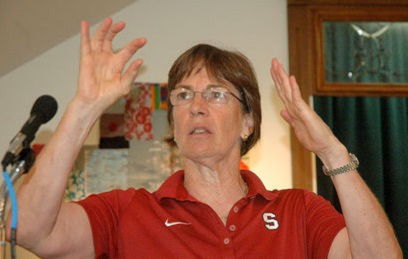The Post-Journal
by Scott Kindberg
July 20, 2013
Cardinal Rule
It was as if the Stanford University women's basketball coach - she of the 894 career victories, two national championships, one Olympic gold medal and a new long-term contract - had entertained a bunch of close friends in her own home for as welcome as she made them all feel.
And, in many ways, Chautauqua is home to VanDerveer.

P-J photo by Scott Kindberg.
She owns a house on the grounds, spends as much time there during the summer season as her schedule will allow and still teaches life lessons she learned there more than 50 years ago to her Cardinal teams.
''I try to re-create Chautauqua,'' said VanDerveer, 60, who signed a new long-term deal at Stanford this week. ''Wouldn't it be great if everybody had a week here, to take it all in, slow down and say hello to people.''
Maybe it's that philsophy that has made the Melrose, Mass., native one of the greatest basketball minds in the history of the sport.
Look it up.
As VanDerveer prepares the 2013-14 Stanford team for another season - the Cardinal leave in August for a trip to Italy - she does so with one of the more remarkable resumes the game has ever seen. Six wins shy of 900 career victories, including 742 since arriving in Palo Alto in 1985, VanDerveer has guided Stanford to 10 Final Fours in 28 seasons and two national titles.
To listen to her talk, though, one gets the feeling that the basketball journey she's experienced while playing/coaching hoops is as important, if not moreso, than the destination.
After all, in what other career path could she watch and learn from Bob Knight (when she attended Indiana University); experience the challenges of coaching/mentoring her younger sister's struggling high school team in Western New York in the early 1970s; turn around collegiate programs at Idaho and Ohio State in the late 1970s and early 1980s; experience the unbridled joy of leading her country to Olympic gold in 1996; and, ultimately, turn Stanford into one of the best women's programs in the nation.
''It's a great life,'' she said, ''and I'm really fortunate to have lived that life.''
But as she recounted personal highlights of her career, VanDerveer, who said she's coaching ''this year and taking one year at a time,'' always came back to the topic of Chautauqua, a place she first experienced with her mom and dad as an 8-year-old.
''This is a caring place, this is a compassionate place, this is a we-have-time-for-each-other place,'' she said. ''That's part of why I'm here. Sometimes out in the world, kids at college do feel it's a rat race, so I really look at players on our team and a place like Stanford and it's about community.
''We have some of the greatest achievers at Stanford, but they are the most humble, compassionate, caring people. That, to me, is much more important than somebody's record, how much money they have or whatever.''
To illustrate that point, VanDerveer recounted the experience she had with Chris MacMurdo, one of her former players, nearly 25 years ago.
Recruited from South Carolina in the late 1980s, MacMurdo, VanDerveer recalled, was No. 1 in her high school class, the senior class president, ''just all-everything.''
So as VanDerveer drove MacMurdo on to the pristine Stanford campus for the first time, she quizzed the freshman about ''what she was thinking right now.''
VanDerveer expected answers ranging from roommates to being 3,000 miles away from home. What the coach heard was totally unexpected.
''She thought for a second, looked over at me and said, 'Tara, I want to make a difference in this world.' ''I was shocked. I thought I was going to crash into a palm tree, but this is what it's all about.''
A few years later, MacMurdo was working in the emergency room at Stanford Hospital the summer between her junior and senior years. VanDerveer recalled how MacMurdo told her how she saved a man's life one day.
''I said, 'Well, you've made a difference,''' VanDerveer said. Call it the Cardinal rule.
The additional financial assistance of the community is critical to the success of the Chautauqua Sports Hall of Fame.
We gratefully acknowledge these individuals and organizations for their generous support.











